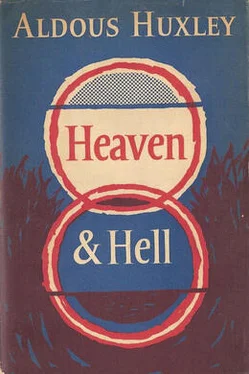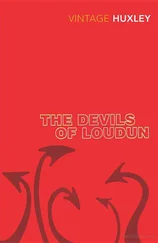Vuillard, incidentally, was a supreme master both of the transporting close–up and of the transporting distant view. His bourgeois interiors are masterpieces of vision–inducing art, compared with which the works of such conscious and so to say professional visionaries as Blake and Odilon Redon seem feeble in the extreme. In Vuillard's interiors every detail however trivial, however hideous even—the pattern of the late Victorian wallpaper, the Art Nouveau bibelot, the Brussels carpet—is seen and rendered as a living jewel; and all these jewels are harmoniously combined into a whole which is a jewel of a yet higher order of visionary intensity. And when the upper middle–class inhabitants of Vuillard's New Jerusalem go for a walk, they find themselves not, as they had supposed, in the department of Seine et Oise, but in the Garden of Eden, in an Other World which is yet essentially the same as this world, but transfigured and therefore transporting. [6] See Appendix V.
* * * * *
I have spoken so far only of the blissful visionary experience and of its interpretation in terms of theology, its translation into art. But visionary experience is not always blissful. It is sometimes terrible. There is hell as well as heaven.
Like heaven, the visionary hell has its praeternatural light and its praeternatural significance. But the significance is intrinsically appalling and the light is 'the smoky light' of the Tibetan Book of the Dead , the 'darkness visible' of Milton. In the Journal d'une Schizophrène , [7] Journal d'une Schizophrène , by M. A. Sèchehaye. Paris, 1950.
the autobiographical record of a young girl's passage through madness, the world of the schizophrenic is called le Pays d'Éclairement —'the country of lit–upness.' It is a name which a mystic might have used to denote his heaven.
But for poor Renée, the schizophrenic, the illumination is infernal—an intense electric glare without a shadow, ubiquitous and implacable. Everything that, for healthy visionaries, is a source of bliss, brings to Renée only fear and a nightmarish sense of unreality. The summer sunshine is malignant; the gleam of polished surfaces is suggestive, not of gems, but of machinery and enamelled tin; the intensity of existence which animates every object, when seen at close range and out of its utilitarian context, is felt as a menace.
And then there is the horror of infinity. For the healthy visionary, the perception of the infinite in a finite particular is a revelation of divine immanence; for Renée, it was a revelation of what she calls 'the System,' the vast cosmic mechanism which exists only to grind out guilt and punishment, solitude and unreality. [8] See Appendix VI.
Sanity is a matter of degree, and there are plenty of visionaries who see the world as Renée saw it, but contrive, none the less, to live outside the asylum. For them, as for the positive visionary, the universe is transfigured—but for the worse. Everything in it, from the stars in the sky to the dust under their feet, is unspeakably sinister or disgusting; every event is charged with a hateful significance; every object manifests the presence of an Indwelling Horror, infinite, all–powerful, eternal.
This negatively transfigured world has found its way, from time to time, into literature and the arts. It writhed and threatened in Van Gogh's later landscapes; it was the setting and the theme of all Kafka's stories; it was Géricault's spiritual home; [9] See Appendix VII.
it was inhabited by Goya during the years of his deafness and solitude; it was glimpsed by Browning when he wrote Childe Roland ; it had its place, over against the theophanies, in the novels of Charles Williams.
The negative visionary experience is often accompanied by bodily sensations of a very special and characteristic kind. Blissful visions are generally associated with a sense of separation from the body, a feeling of deindividualization. (It is, no doubt, this feeling of deindividualization which makes it possible for the Indians who practice the peyote cult to use the drug not merely as a short cut to the visionary world, but also as an instrument for creating a loving solidarity within the participating group.) When the visionary experience is terrible and the world is transfigured for the worse, individualization is intensified and the negative visionary finds himself associated with a body that seems to grow progressively more dense, more tightly packed, until he finds himself at last reduced to being the agonized consciousness of an inspissated lump of matter, no bigger than a stone that can be held between the hands.
It is worth remarking, that many of the punishments described in the various accounts of hell are punishments of pressure and constriction. Dante's sinners are buried in mud, shut up in the trunks of trees, frozen solid in blocks of ice, crushed beneath stones. The Inferno is psychologically true. Many of its pains are experienced by schizophrenics, and by those who have taken mescalin or lysergic acid under unfavourable conditions. [10] See Appendix VIII.
What is the nature of these unfavourable conditions? How and why is heaven turned into hell? In certain cases the negative visionary experience is the result of predominantly physical causes. Mescalin tends, after ingestion, to accumulate in the liver. If the liver is diseased, the associated mind may find itself in hell. But what is more important for our present purposes is the fact that negative visionary experience may be induced by purely psychological means. Fear and anger bar the way to the heavenly Other World and plunge the mescalin taker into hell.
And what is true of the mescalin taker is also true of the person who sees visions spontaneously or under hypnosis. Upon this psychological foundation has been reared the theological doctrine of saving faith—a doctrine to be met with in all the great religious traditions of the world. Eschatologists have always found it difficult to reconcile their rationality and their morality with the brute facts of psychological experience. As rationalists and moralists, they feel that good behaviour should be rewarded and that the virtuous deserve to go to heaven. But as psychologists they know that virtue is not the sole or sufficient condition of blissful visionary experience. They know that works alone are powerless and that it is faith, or loving confidence, which guarantees that visionary experience shall be blissful.
Negative emotions—the fear which is the absence of confidence, the hatred, anger or malice which exclude love—are the guarantee that visionary experience, if and when it comes, shall be appalling. The Pharisee is a virtuous man; but his virtue is of the kind which is compatible with negative emotion. His visionary experiences are therefore likely to be infernal rather than blissful.
The nature of the mind is such that the sinner who repents and makes an act of faith in a higher power is more likely to have a blissful visionary experience than is the self–satisfied pillar of society with his righteous indignations, his anxiety about possessions and pretensions, his ingrained habits of blaming, despising and condemning. Hence the enormous importance attached, in all the great religious traditions, to the state of mind at the moment of death.
Visionary experience is not the same as mystical experience. Mystical experience is beyond the realm of opposites. Visionary experience is still within that realm. Heaven entails hell, and 'going to heaven' is no more liberation than is the descent into horror. Heaven is merely a vantage point from which the divine Ground can be more clearly seen than on the level of ordinary individualized existence.
Читать дальше











